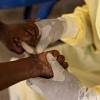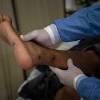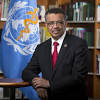Mpox
2024 - 8 - 14Mpox: The New Global Health Emergency That’s Got Everyone Talking!
Democratic Republic of Congo - Global Health - HIV - Infectious Diseases - Monkeypox - Mpox - Public Health Emergency - Vaccine Accessibility - WHOWhat happens when a disease reminiscent of early HIV takes the world stage? Buckle up, the WHO has declared mpox a global health emergency!
In a startling announcement, the World Health Organization (WHO) has declared the rise of mpox, previously known as monkeypox, a global public health emergency. This decision comes in response to a severe outbreak sweeping across Africa, with the Democratic Republic of the Congo bearing the brunt of the surge. With over 15,000 reported cases and 461 deaths in the region this year alone, the alarm bells are ringing louder than ever, resembling the early days of the HIV epidemic which also caught the world off guard. Experts are now urging for accelerated access to vaccines and more extensive testing to combat this resurging threat.
The WHO’s declaration is significant, signifying the urgency of the situation as various strains of the mpox virus pose threats not only to Africa but potentially to other parts of the world as well. The organization has stressed the importance of immediate action and collaboration among nations to control this outbreak before it spirals further out of control. With a global interconnectedness like never before, the impact of such health emergencies can ripple across continents, making it crucial to have a proactive approach in place.
As much as it sounds like a plot twist from an apocalyptic movie, this isn’t science fiction; it's real life! In recent weeks, we're witnessing nations gearing up to tackle this threat by focusing on testing, collecting data, and reinforcing healthcare systems in affected regions. International health bodies are also reminding us of the need for vigilance as we navigate through this alarming resurgence of mpox. The directive now is clear: time to roll up those sleeves and spread awareness just like we got our jabs for COVID-19!
But hold on! It’s not all doom and gloom. Understanding how mpox spreads is pivotal to preventing its transmission. Most notably, contact with infected individuals or contaminated materials is the main mode of transmission, so maintaining proper hygiene and minimizing close contact can greatly reduce risk. Plus, here’s a fun fact: did you know that despite its name, the mpox virus isn't just found in monkeys? In fact, it can also be transmitted through other wild animals, including rodents, which can often act as unsuspecting hosts.
In closing, while the world gears up to face this global health emergency, let’s not forget the lessons we've learned from past outbreaks. Awareness, education, and prompt action can make a world of difference in overcoming challenges like mpox. If we work together, we can not only prevent the spread of this virus but also safeguard public health for future generations!

WHO declares mpox a global public health emergency (RTE.ie)
The World Health Organization (WHO) has declared the mpox surge in Africa a global public health emergency, sounding its highest possible alarm over the ...

Mpox outbreak in Africa is public health emergency resembling early ... (The Guardian)
Outbreak resembles early days of HIV, say experts, urging accelerated access to vaccines and testing.

WHO declares mpox global emergency (POLITICO.eu)
The World Health Organization (WHO) has declared a new global health emergency as Africa grapples with a fast-spreading and deadly outbreak of mpox.

WHO declares 2024 mpox surge is 'a public health emergency of ... (NPR)
Cases of mpox — previously called monkeypox — have been surging in the Democratic Republic of Congo. In recent weeks, cases have appeared in nearby African ...

WHO Director-General's opening remarks at the IHR Emergency ... (World Health Organization)
Dear members of the Emergency Committee, colleagues and friends,. As you know, mpox has been reported in the Democratic Republic of the Congo for more than ...

WHO chief warns of outbreaks of different clades of mpox virus (UN News)
The chief of the World Health Organization (WHO) briefed an emergency committee meeting of the international health regulations body on Wednesday over the ...

How does mpox spread and what is the risk to the rest of the world? (Sky News)
Africa's top health body has declared a public health emergency after more than 15000 cases and 461 deaths were reported on the continent this year.
Explore the last week
- 2025 - 02 - 21, 3 topics across 18 articles.
- 2025 - 02 - 20, 27 topics across 276 articles.
- 2025 - 02 - 19, 43 topics across 503 articles.
- 2025 - 02 - 18, 19 topics across 189 articles.
- 2025 - 02 - 17, 27 topics across 433 articles.
- 2025 - 02 - 16, 33 topics across 363 articles.
- 2025 - 02 - 15, 37 topics across 326 articles.